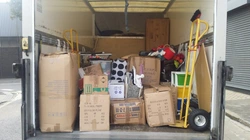How to Avoid Stress When Moving to a New Home
Moving to a new home is among the most significant transitions in life. While it's filled with promise and excitement, it can also bring about a great deal of stress and anxiety. If you are preparing for a relocation, you may be wondering how to avoid stress when moving to a new home and make the process as smooth and manageable as possible. This comprehensive guide will walk you through proven strategies to minimize moving stress, stay organized, and even find enjoyment in your big move.
Why Moving Causes Stress
Moving represents both an ending and a new beginning. Beyond merely moving physical belongings, you're leaving behind familiar environments, routines, and often relationships. Here are some common reasons people feel stressed during a move:
- Change in environment--new neighborhoods, schools, and even shops can be unsettling.
- Emotional attachment--leaving a place full of memories can cause anxiety or sadness.
- Physical demands--packing, lifting, organizing, and cleaning are exhausting tasks.
- Financial burden--moving costs, deposits, and inevitable surprises can strain budgets.
- Time constraints--balancing moving tasks with work and family life is challenging.

Top Tips to Avoid Stress When Moving to a New Home
While some stress comes naturally with any move, being proactive can prevent most of it. Here's how you can minimize stress during the moving process and make the journey much smoother.
1. Start Planning Early
One of the main reasons moving becomes overwhelming is a lack of preparation. Start your moving plan at least two months in advance. This gives you ample time to line up important details and avoid last-minute panic. Consider creating a moving checklist that includes:
- Hiring movers or renting a truck
- Setting up utilities and address changes
- Packing strategies and supply lists
- Important deadlines--like lease end dates or closing dates
- Unpacking priorities and room layout plans for your new house
An organized timeline helps you break the process into smaller, more manageable steps and can go a long way toward reducing moving anxiety.
2. Declutter Before You Pack
One critical way to reduce stress when moving to a new home is to declutter your belongings. Moving is the perfect opportunity to let go of items you no longer need or use. Not only does this lighten your load, but it can also save you time and money by reducing the number of boxes and the need for a bigger truck or more movers.
- Sort Items: Go through each room and separate things into 'keep,' 'donate/sell,' and 'discard' categories.
- Host a Garage Sale: Sell things you don't need and earn extra cash for your move.
- Donate Unwanted Stuff: Many charities will pick up donations, saving you both time and effort.
Decluttering not only streamlines the packing process, but also gives you a fresh start in your new space.
3. Create a Labeling System
Labeling your boxes is a simple yet highly effective way to avoid stress during a move. Use a consistent labeling system to identify each box's contents and designated room. Consider labeling on multiple sides for better visibility. You can use color-coded stickers or markers to make sorting easier.
- Mark boxes with contents and new room location
- List essential items separately as 'open first'
- Photograph electronics setups, so reassembly is easier
When it's time to unpack, you'll know exactly what's inside each box--saving time and headaches.
4. Pack a Moving Essentials Bag
The day you move can be incredibly hectic. Packing an 'essentials' bag or box ensures you'll have everything you need right away, without digging through endless boxes. Essentials might include:
- Important paperwork and identification
- Medications and first aid kit
- Toiletries and a couple of changes of clothes
- Snacks, water, and phone chargers
- Basic tools for furniture assembly and cleaning supplies
This simple step can dramatically reduce stress on moving day and ensure a smooth first night in your new home.
5. Hire Reliable Movers or Recruit Help
Moving involves heavy lifting and lots of logistics. Depending on your budget and situation, you might opt for professional movers or ask friends and family for help. Here's what you need to know:
- Research moving companies: Read reviews, get multiple quotes, and check their insurance policies.
- Book early: Good moving companies get booked months in advance, especially during peak seasons.
- Communicate clearly: Provide detailed instructions and label fragile or high-priority items.
If you're moving yourself, don't hesitate to ask for help. More hands make for lighter work and can make the process less lonely and more enjoyable.
6. Notify Important Parties About Your Move
To avoid disruption and future headaches, make sure to notify important organizations and people about your change of address well ahead of time. This includes:
- Banks and credit card companies
- Utilities and internet service providers
- Insurance companies
- The post office (set up mail forwarding)
- Healthcare providers and schools
- Friends and family
This proactive sweep ensures you won't miss important correspondence or face service interruptions after your move to a new house.
7. Take Care of Your Well-Being
It's easy to neglect self-care when caught up in the flurry of moving tasks, but managing stress when relocating means making time for your health. Prioritize:
- Eating regular, nutritious meals
- Staying hydrated
- Getting enough sleep
- Taking breaks for physical activity and relaxation
- Leaning on support networks and talking about your feelings
Your well-being should never take a back seat, even during a major life change such as moving.
8. Accept Help and Delegate Tasks
Many people take on too much, leading to avoidable stress. If friends or relatives offer help, accept it! Assign specific tasks such as watching children, packing fragile items, or preparing meals. If your budget allows, consider services that specialize in cleaning, packing, or organizing.
Delegating reduces your workload and invites others to share in the moving experience with you.
9. Stay Flexible and Prepare for the Unexpected
Even with perfect planning, some part of your move may not go as expected. Trucks might be delayed, weather could intervene, or items could break. Flexibility is key to stress-free moving. When surprises occur, take a deep breath, reassess, and adapt your plan as necessary. Remember, most issues are temporary and can be solved with some patience.
10. Celebrate the Move
Once the heavy lifting is done and you're in your new home, take time to enjoy it! Host a housewarming (even a small one), explore your new neighborhood, and acknowledge the hard work you've accomplished. Moving is a major achievement, so celebrating your success can help close the stressful chapter and open a new, exciting one.
Coping with Emotional Stress When Moving to a New House
The mental and emotional side of moving is not to be underestimated. Relocation stress can come from nostalgia, worry, or the fear of the unknown. Here are some ways to cope:
- Acknowledge your feelings: It's normal to feel sad or anxious about leaving a familiar place. Let yourself grieve, but be excited for new beginnings.
- Stay connected: Make plans to visit old friends or keep in touch through calls and social media.
- Document the journey: Take photos of your old home, write down fond memories, or make a scrapbook to honor your past.
- Focus on the positives: List things you look forward to in your new home--like new amenities, nearby activities, or new opportunities.
- Seek support: Don't hesitate to talk with a counselor or therapist if you feel overwhelmed by the change.
Helping Kids and Pets Avoid Moving Stress
Children and pets often have a hard time adjusting to a move. To minimize stress on them:
- Discuss the move in advance, highlighting the positive aspects
- Visit the new neighborhood together, if possible
- Maintain routines as much as you can before and after the move
- Let kids pack a favorite 'treasure box' of items to keep close
- For pets, pack their beds, toys, and familiar items, and consider leaving them with a trusted friend on moving day
A little empathy can go a long way in helping everyone in the family avoid stress when moving to a new home.

FAQs: How Can I Make My Move Less Stressful?
How do I stay organized during a move?
Use a moving checklist, keep important paperwork together, and label boxes clearly. Divide tasks into daily or weekly goals to avoid feeling swamped.
Is it better to move myself or hire movers?
If your budget allows, using professionals can reduce both physical and mental stress. However, a do-it-yourself move may be less expensive if you have sufficient help and a flexible schedule.
When is the best time to move?
Weekdays and mid-month are usually less busy (and less expensive) for moving companies. Avoid weekends and peak summer months if possible to minimize stress and costs.
How do I pack fragile or valuable items?
Use sturdy boxes, cushion items with bubble wrap or clothes, and label them 'fragile' on all sides. Transport valuables yourself, if possible.
Final Thoughts: Make Your Move a Positive Experience
While moving to a new home can be daunting, it doesn't have to be unbearably stressful. With early planning, a systematic approach, and a positive attitude, you can move with less stress and greater confidence. Remember to ask for help, take care of your emotional wellbeing, and celebrate each step along the way. The process might be challenging at times, but it's also the start of a fresh, exciting chapter in your life.
By following these tips, you'll not only avoid stress when moving to your new home but also set yourself up for a happier, more comfortable transition.


